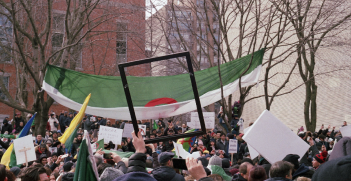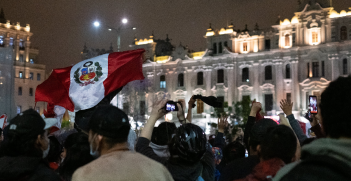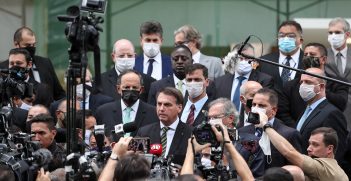Cornered by a Crisis of Her Own Creation: Chief Executive Carrie Lam and Hong Kong’s Current Protests

Hong Kong’s residents are protesting en masse against a proposed extradition law that would allow Beijing to tighten its control over their city. The blame for this crisis should fall on the shoulders of the Chief Executive Carrie Lam.
Hong Kong has been in crisis since Chief Executive Lam decided to force through her new extradition law. And the scale of that crisis intensified beyond our expectations when protestors surrounded Hong Kong’s Legislative Council (Legco) on 12 June to block the second reading of that bill.
The government then called on the police to forcefully — using tear gas, pepper spray and rubber bullets — clear the streets in downtown Hong Kong so legislators could reach parliament and pass this controversial bill.
But despite the use of violence by protestors, which should be condemned, and for which some of them may go to jail, the real blame for this crisis falls on the shoulders of the chief executive herself. It is hard to comprehend why she felt a need to table a bill that is clearly seen by a majority of Hong Kongers, by the foreign business community, by many of Hong Kong’s professionals — lawyers in particular — and by the outside world, as another step in the continuing erosion of the “one country, two systems” policy which heretofore has largely guaranteed the economic and political freedoms of Hong Kong.
But should we be surprised? The last 22 years since the reversion of sovereignty over Hong Kong to the People’s Republic of China, Hong Kong’s top leaders have mismanaged their efforts to tighten local government and Beijing’s control over Hong Kong society.
In 2003, when then Chief Executive C.H. Tung, proposed a new national security law, as mandated by Hong Kong’s Basic Law — its mini-constitution — 500,000 largely middle-class protestors took to the street, forcing Tung to withdraw the bill. He soon resigned for “bad health.”
In 2009, then Chief Executive C.Y. Leung, targeted Hong Kong youth’s negative perception of China’s social and political system, by proposing a new National Education Law. But when one potential educational text glorified the Chinese Communist Party as composed of selfless individuals — despite the intensive corruption in China — and lauded Chinese socialism as superior to capitalism, 100,000 people marched and hunger strikers took over the grounds outside the chief executive’s office, forcing Leung to withdraw the bill.
Occupy Central in 2014 was in response to a proposed electoral reform which, for the first time, would have afforded all Hong Kongers the right to vote for the chief executive. But candidate selection was to be restricted to 1,200 largely pro-Beijing members of a “Nomination Committee,” insuring that no member of the pan-democratic camp could run. Proposals by social organisations that recommended a more open nomination system were ignored. Unlike the first two cases, where Beijing worked behind the scenes, the Standing Committee of its National People’s Congress directly proposed this “electoral democracy with Chinese characteristics.” The result was a 79-day shutdown of downtown Hong Kong, and Leung was not given a chance to run for a second term.
So why did Lam do it? We all believed that Beijing’s mandate to Lam, who replaced Leung, was to resolve the economic problems expressed during Occupy Central, such as a lack of housing for the young and better retirement plans for Hong Kong’s rapidly aging population. Lam already had successfully weakened the pan-democratic camp by ejecting six members of Legco, and preventing other democrats from running for public office, ending the democrats’ ability to block unpopular government policy. Moreover, Hong Kongers were accepting deeper economic integration with the Mainland, largely because economic integration is less threatening than political integration, and Hong Kong’s high standard of living cannot be divorced from its business ties to China. But it is abundantly clear that the majority of Hong Kongers will resist efforts by the Hong Kong government and Beijing to constrain their freedoms despite claims by the Hong Kong government and Beijing that such restrictions are necessary to enhance China’s national security and sovereignty.
While many pundits, pan-democrats and outside observers see Lam as stuck between Beijing and Hong Kong society, this appears to be a crisis of Lam’s own doing. Unlike Tung in 2003 and Leung in 2012, who withdrew their proposals, she has ignored the voices of Hong Kong society, rejecting their fears of the Mainland and arguing that Hong Kongers simply do not understand her law. But this law lowers legal barriers between Hong Kong and the Mainland, eroding the “two systems” component while enhancing the centrality of “one country.”
Under the proposed law, a person deemed by Beijing to have committed a crime on the Mainland will go on trial there, if a Hong Kong judge and the chief executive accept the prima facie evidence presented by the Mainland, which could be doctored for political or economic reasons. Moreover, the accused will have no right to defend themselves in Hong Kong’s court system. But with hundreds of Hong Kong businessmen languishing in jails on the Mainland, some on trumped-up charges resulting from business disputes, and the kidnapping of five Hong Kong booksellers from Hong Kong and Thailand, by Mainland authorities and their subsequent televised “confessions,” any policy that facilitates the removal of Hong Kong residents to the Mainland for trial will trigger a massive, even violent, response.
But is Beijing behind this law? Would they want such a crisis at this time? In January this year, Chinese President Xi Jinping highlighted the numerous politically sensitive anniversaries this year: the 100th anniversary of the 1919 May Fourth movement, which signifies the emergence of democratic values in early 20th century China, the 70th anniversary of the founding of the People’s Republic of China in 1949 and most important, the 30th anniversary of 4 June 1989, which still haunts Chinese politics. This current unrest in Hong Kong increases the Sino-US trade war’s deleterious impact on the Chinese economy by risking the abrogation of the US Congress’ Hong Kong Policy Act, which assures Hong Kong all of the economic privileges it had while it was a British colony. A violent police crackdown in Hong Kong, or further tightening of democratic freedoms as entailed in the Extradition Law, is leading many in the US to call on President Trump to abrogate this law, which he can do by a swipe of his pen. While the likelihood remains moderate, should he do so, Hong Kong would suffer terribly and Beijing would be deeply wounded.
Finally, if Lam’s commission from Beijing was to promote economic development, this law will be her undoing. Hundreds of foreign companies use Hong Kong as a home base for their staff to jump into the Mainland. But under the Extradition Treaty, business people, who may commit misdeeds on the Mainland, where the market economy is replete with numerous grey zones, can no longer feel safe in Hong Kong: many companies may move to Singapore or even Taiwan. That situation is now compounded by the recent violence, and the possibility that unrest will persist, hurting Hong Kong’s stocks, housing prices, and business confidence in general in the medium term. So, unless she can find some way to back down, perhaps by admitting that she has misjudged the level of opposition, Hong Kong is in for a bad time. As for Lam herself, she will be lucky if Beijing lets her finish this term in office, and can no longer expect a second term on the horizon.
Professor David Zweig will become professor emeritus of social science at the Hong Kong University of Science and Technology at the end of June. He is also director of Transnational China Consulting Limited.
This article is published under a Creative Commons Licence and may be republished with attribution.





